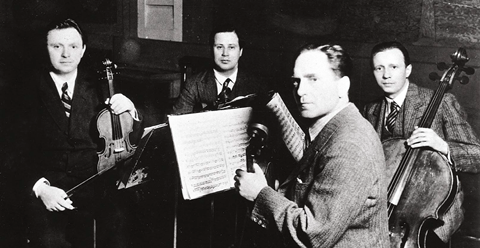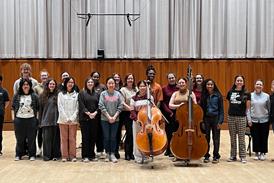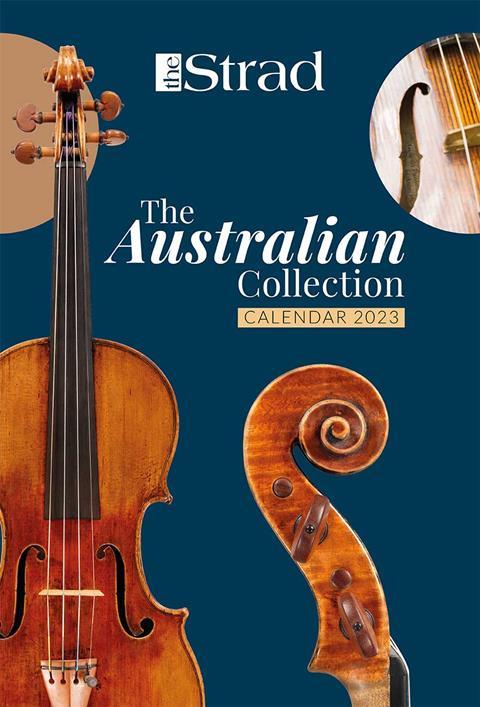The more that music critic David Cairns listens to the Busch Quartet, the more he admires the legendary group

Discover more Featured Stories like this in The Strad Playing Hub
This article appeared in the October 2013 issue of The Strad
The Busch was the first quartet I heard on record, when I was about 15. I’d been a passionate lover of Beethoven for several years, spending hours searching the radio (Hilversum, Schenectady, Bratislava, anywhere) for performances of the symphonies and thrilled to the marrow when I alighted on one. But I’d been told I was too young to appreciate the late quartets. Yet when I heard a recording of the Quartet in A minor op.132 by the Busch Quartet, I couldn’t believe my ears – the music was so lyrical, so beautiful. Sometimes as a child you love a recording and then when you hear it again as an adult you can’t think why you admired it. That’s not the case with the Busch Quartet: the more I listen, the greater it seems.
After op.132, the next Busch Quartet record I got was op.131. Busch’s playing of the opening epitomises his genius. The even flow of notes that follows the anguish of the long sforzato A is both heavily laden and purposeful, conveying in the same gesture grief and acceptance of it. I can’t say how he does that – it just seems to me that he understands Beethoven like no one else. There’s space – so many musicians don’t give music enough room – but at the same time there’s powerful forward momentum. The players nearly always seem to find the right tempo. Their Beethoven op.127 is extraordinary, with a wide range of colour and texture. The beginning of the slow movement, as each of the instruments comes in one after the other on those enigmatic held notes, is like four souls communing with each other. Then the long, rapt theme unfolds, and you wonder how they can possibly sustain such a slow tempo, but they do. In the slow movement of op.132, again, the intensity, the emotional energy they generate is incandescent.
In their recording of Beethoven’s op.59 no.3 there’s a wonderful moment in the slow movement when the harmony drifts down from E flat towards the home key of A minor – they achieve an uncanny stillness by perfect control of dynamics and minimal vibrato. Today there’s a great movement against vibrato but Busch was playing in a period when continuous vibrato was coming in, yet he and the quartet are quite sparing with it. They use it not as an automatic way of playing, but as an expressive device.
Then there’s their Brahms. One should never say that any recording is definitive, but I almost feel I don’t want to hear anyone else play the Clarinet Quintet, which they recorded in 1937 with Reginald Kell. It’s the same with the Piano Quintet with Rudolf Serkin.
Some people say Busch is too dominant in the group, but I don’t feel that. The other three players are inspired by the same feeling and dedication, and by the same understanding of the music. As a group they have terrific rhythmic vitality: I’ve never heard any quartet play the last movement of Beethoven op.131 with such ferocity, such burning intensity.
Busch severed all connections with Germany when the Nazis came in and refused to go back, although Hitler was always trying to get him to return. He gave up a huge amount: his career as composer, his renown as the greatest German violinist since Joachim. Yet the decision was never for an instant in doubt; it was for him, as the art historian Ernst Gombrich said, ‘as natural and unproblematic as everything he did’.
He had this incredible certainty about what he should do, and this informs his music making. This uncompromising idealism is what we hear in his playing and that of the musicians he worked with and inspired.
INTERVIEW BY ARIANE TODES
Read: Quartet identity: Alchemy of the souls
Read: Masterclass: Beethoven String Quartet op.132
Read: Masterclass: violist Emilie Hörnlund on Beethoven String Quartet op.59 no.1
Read more Featured Stories like this in The Strad Playing Hub
The number one source for playing and teaching books, guides, CDs, calendars and back issues of the magazine.
In The Best of Technique you’ll discover the top playing tips of the world’s leading string players and teachers. It’s packed full of exercises for students, plus examples from the standard repertoire to show you how to integrate the technique into your playing.
The Strad’s Masterclass series brings together the finest string players with some of the greatest string works ever written. Always one of our most popular sections, Masterclass has been an invaluable aid to aspiring soloists, chamber musicians and string teachers since the 1990s.
This year’s calendar celebrates the top instruments played by members of the Australian Chamber Orchestra, Melbourne Symphony, Australian String Quartet and some of the country’s greatest soloists.













































No comments yet